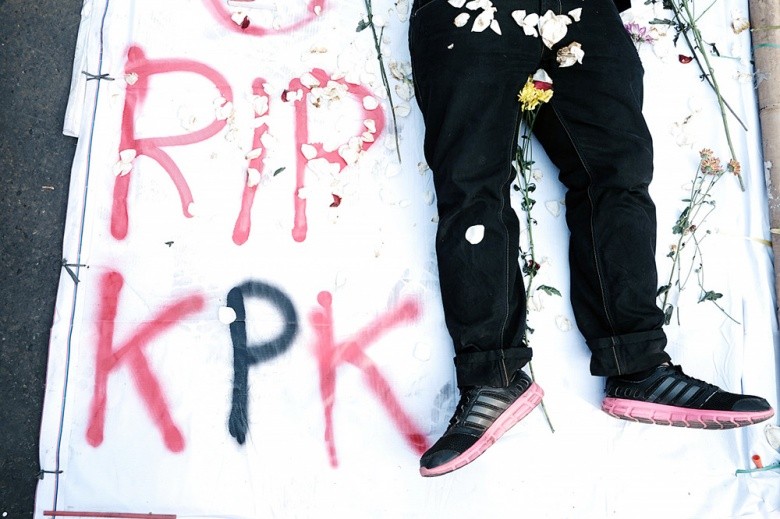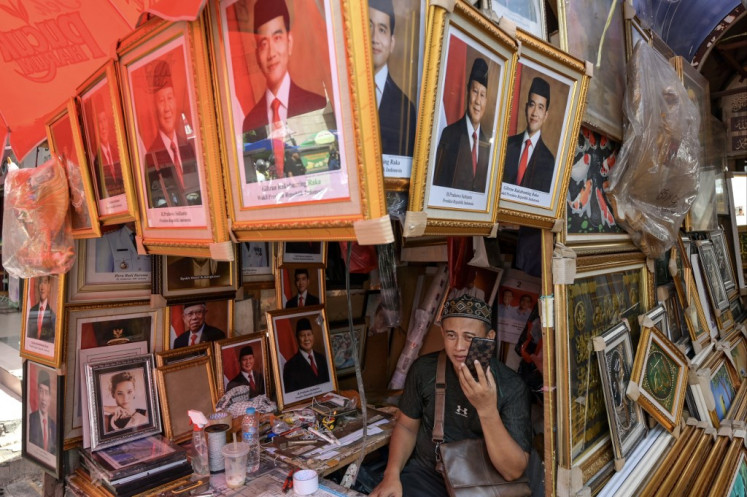How democracy dies
The irony in Indonesia’s situation is that the intensified attacks on democratic norms and institutions took place especially in the past five years, during the administration of President Joko “Jokowi” Widodo, who was once hailed as the new face of Indonesian democracy. Jokowi is by no means responsible for the decline of Indonesian democracy, but he did very little to arrest the regression, while some of his policies have certainly helped members of the elite that helped catapult him into the presidency.
Change Size
 When checks-and-balances mechanisms have become too cumbersome, these same political elites will have no problem launching direct attacks on independent oversight bodies like the antigraft commission or the Constitutional Court. (JP/Donny Fernando)
When checks-and-balances mechanisms have become too cumbersome, these same political elites will have no problem launching direct attacks on independent oversight bodies like the antigraft commission or the Constitutional Court. (JP/Donny Fernando)
D
emocracy doesn’t die in one fell swoop. It is not like a train rolling into town and making an abrupt stop. Gone are the days when soldiers in military fatigue brandishing assault weapons patrol the city in tanks and declare martial law. If and when democracy dies, it is likely the result of thousands cuts and stabs directed at the body politic, cutting its life support and destroying its nerve system. The demise of a liberal democratic regime will likely end up giving birth to an autocrat or a populist leader, but the process to chip away democracy result from collective action taken by a political elite that acts solely on self-interest.
To secure patronage networks built around the political party system, elites make efforts to take effective control of political parties, packing their central boards with family members and minions, an act that, in the long run, could blunt political parties’ effectiveness in performing their work to aggregate voters’ interests.
Political parties, the workhorses of a healthy democracy, now controlled by these self-dealing elites, will only be an accessory in a political system that only resembles a procedural democracy.
Also, in the effort to secure their interests, barons of the media, supposedly the fourth pillar of democracy, are willing to join the government and as a result will only give favorable coverage to those in power. And when checks-and-balances mechanisms have become too cumbersome, these same political elites will have no problem launching direct attacks on independent oversight bodies like the antigraft commission or the Constitutional Court.
When the public space, both online and offline, has become too crowded with criticism directed at the government, a coalition of political elites that controls the state apparat has no problem unleashing hell on dissenters. On social media, government critics are now subjected to attacks from trolls, bots and influencers while street protests are dealt with the most heavy-handed approach.
The blow-by-blow account on how democracy regresses may look and sound like a distant dystopian future, but that was actually how scholars and analysts describe the assault on Indonesia’s democracy in the recently published book Democracy in Indonesia: From Stagnation to Regression?
The irony in Indonesia’s situation is that the intensified attacks on democratic norms and institutions took place especially in the past five years, during the administration of President Joko “Jokowi” Widodo, who was once hailed as the new face of Indonesian democracy. Jokowi is by no means responsible for the decline of Indonesian democracy, but he did very little to arrest the regression, while some of his policies have certainly helped members of the elite that helped catapult him into the presidency.
The saving grace to Indonesia’s democracy could be found in civil society and grassroots organizations. Yet, some of the research in the book has less-than-favorable reviews on these civil society organizations. Even some mainstream organizations like Nahdlatul Ulama have tried their hand at illiberal actions.
The unraveling has begun, and liberal-minded actors and organizations must work harder to arrest this decline.









